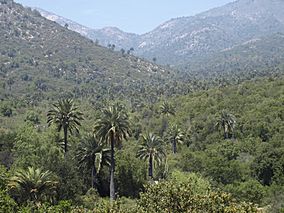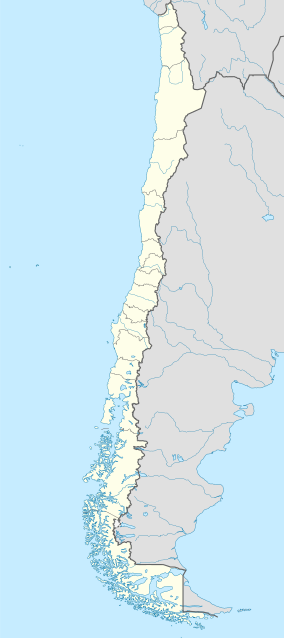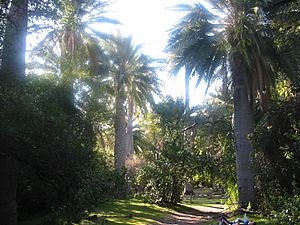La Campana National Park facts for kids
Quick facts for kids La Campana National Park |
|
|---|---|
|
IUCN Category II (National Park)
|
|
 |
|
| Location | Valparaíso Region, Chile |
| Nearest city | Olmué |
| Area | 80 km² |
| Established | 1967 |
| Visitors | 52,389 (in 2012) |
| Governing body | Corporación Nacional Forestal |
La Campana National Park is a special place in the Valparaíso Region of Chile. It is located in the Cordillera de la Costa mountains. This park covers about 80 square kilometers (31 square miles). It is famous for being home to one of the last natural forests of the Jubaea chilensis, also known as the Chilean Wine Palm. Long ago, these palms grew in many more places.
Another exciting part of the park is Cerro La Campana, a mountain that gives the park its name. A very famous scientist, Charles Darwin, climbed this mountain in 1834. He did this during his second trip on the HMS Beagle ship. In 1984, UNESCO named La Campana National Park and the nearby Lago Peñuelas National Reserve a Biosphere Reserve. This means it is a special area recognized for its unique nature and for showing how people can live with nature.
Contents
Amazing Plants and Animals
La Campana National Park is part of the Chilean matorral ecoregion. This is a type of habitat with many shrubs and tough plants. The park is a great place to see many different kinds of plants and animals.
Chilean Wine Palm Forests
One of the most important plants here is the Jubaea chilensis, or Chilean Wine Palm. You can find large groups of these palms in the Ocoa Valley within the park. These palms are very old and can grow quite tall. They are a reminder of how Chile looked a long time ago.
Other Unique Plants
Besides the famous palms, the park has many other interesting plants. You might see the Echinopsis chiloensis, which is a type of cactus. There is also the Puya chilensis, a plant with spiky leaves and tall flower stalks. Other common trees and shrubs include the roble (a type of oak), boldo, litre, peumo, patagua, winter's bark, and lingue. These plants are all part of the unique ecosystem of the Chilean matorral.
Images for kids
-
Echinopsis chiloensis & Puya chilensis habitat
See also
 In Spanish: Parque nacional La Campana para niños
In Spanish: Parque nacional La Campana para niños
 | George Robert Carruthers |
 | Patricia Bath |
 | Jan Ernst Matzeliger |
 | Alexander Miles |






